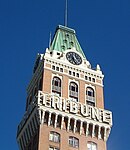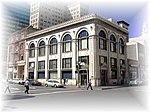The University of California (UC) is a public land-grant research university system in the U.S. state of California. The system is composed of the campuses at Berkeley, Davis, Irvine, Los Angeles, Merced, Riverside, San Diego, San Francisco, Santa Barbara, and Santa Cruz, along with numerous research centers and academic abroad centers. The system is the state's land-grant university.The University of California was founded on March 23, 1868, and operated in Oakland before moving to Berkeley in 1873. Over time, several branch locations and satellite programs were established. In March 1951, the University of California began to reorganize itself into something distinct from its campus in Berkeley, with UC President Robert Gordon Sproul staying in place as chief executive of the UC system, while Clark Kerr became the first chancellor of UC Berkeley and Raymond B. Allen became the first chancellor of UCLA. However, the 1951 reorganization was stalled by resistance from Sproul and his allies, and it was not until Kerr succeeded Sproul as UC President that UC was able to evolve into a university system from 1957 to 1960. At that time, chancellors were appointed for additional campuses and each was granted some degree of greater autonomy.The University of California currently has 10 campuses, a combined student body of 285,862 students, 24,400 faculty members, 143,200 staff members and over 2.0 million living alumni. Its newest campus in Merced opened in fall 2005. Nine campuses enroll both undergraduate and graduate students; one campus, UC San Francisco, enrolls only graduate and professional students in the medical and health sciences. In addition, the UC Hastings College of the Law, located in San Francisco, is legally affiliated with UC, but other than sharing its name is entirely autonomous from the rest of the system. Under the California Master Plan for Higher Education, the University of California is a part of the state's three-system public higher education plan, which also includes the California State University system and the California Community Colleges system. UC is governed by a Board of Regents whose autonomy from the rest of the state government is protected by the state constitution. The University of California also manages or co-manages three national laboratories for the U.S. Department of Energy: Lawrence Berkeley National Laboratory (LBNL), Lawrence Livermore National Laboratory (LLNL), and Los Alamos National Laboratory (LANL).Major publications generally rank most UC campuses as being among the best universities in the world. Eight of the campuses, Berkeley, Davis, Irvine, Los Angeles, Santa Barbara, San Diego, Santa Cruz, and Riverside, are considered Public Ivies, making California the state with the most universities in the nation to hold the title. UC campuses have large numbers of distinguished faculty in almost every academic discipline, with UC faculty and researchers having won 71 Nobel Prizes as of 2021.










